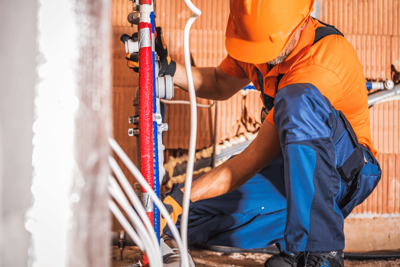
If you live in Miami, you're already familiar with the beauty of ocean breezes, vibrant culture, and year-round sunshine. But what many homeowners don’t realize is that aging infrastructure, especially old water lines, can cause serious problems. Beneath the charm of many older homes lies a hidden threat—decaying pipes that may be long overdue for replacement.
So, should you replace your water line if you have an older home in Miami? The short answer: probably. But let’s explore the details and why calling a water lines plumber in Miami could be the smartest move you make this year.
Why Water Lines Matter More Than You Think
Your home’s water line is its lifeline. It carries clean water from the city’s main supply to your faucets, toilets, showers, and appliances. Without it, daily life would come to a screeching halt. Over time, however, this vital system can degrade, especially in cities like Miami where humidity, salt in the air, and shifting soil can accelerate corrosion and wear.
Old pipes can also affect your health. Lead or galvanized steel pipes, common in homes built before the 1960s, can leach dangerous metals into your drinking water. Even if the city’s water supply is clean, contaminated pipes inside or just outside your home could put your family at risk.
How Old Is Too Old?
Many Miami homes have plumbing systems that are 40, 50, or even 70 years old. If your home was built before 1985 and hasn’t had a full plumbing update, there’s a good chance your water lines are reaching the end of their lifespan.
Here are some general guidelines:
Copper pipes can last 50+ years, but Miami’s acidic water can shorten their lifespan.
Galvanized steel pipes usually last about 40–50 years.
Polybutylene pipes, used in the 1980s and early '90s, are prone to cracking and should be replaced immediately if found.
Knowing the age and type of your pipes is the first step toward determining if replacement is necessary.
Signs You Might Need to Replace Your Water Line
You don’t have to be a plumber to recognize the warning signs of failing pipes. Here are a few red flags Miami homeowners should watch for:
Discolored Water: If your tap water has a brown or yellow tint, it could be rust from corroded pipes.
Low Water Pressure: Mineral buildup or leaks in old pipes can reduce water flow to your faucets.
Frequent Leaks: A leaky pipe once in a while may not be a big deal, but regular leaks could indicate systemic failure.
Wet Spots in the Yard: If you notice soggy areas or unusually green patches in your yard, it could mean your main water line is leaking underground.
Unexplained High Water Bills: A damaged or leaking pipe can cause a sudden spike in your utility costs.
If you’re experiencing any of these symptoms, it’s time to bring in a licensed plumber for a full inspection.
Why Miami Homes Are Especially Vulnerable
Miami’s unique climate and geography pose extra challenges for water lines. The high water table and porous limestone soil can put extra pressure on underground pipes, leading to faster wear and more frequent failures. Add in potential salt exposure in coastal areas and you’ve got a recipe for corrosion.
Additionally, Miami’s rapid urban development has put more strain on the city’s aging water infrastructure. In some neighborhoods, the increased water pressure from city upgrades can stress old residential pipes, causing unexpected breaks or leaks.
The Benefits of Replacing Your Water Line
While replacing a water line can be an investment, it often pays off in the long run. Here’s why:
Peace of Mind: You’ll no longer have to worry about surprise leaks or contaminated water.
Increased Property Value: Modern plumbing is a selling point for potential buyers, especially in competitive real estate market like Miami.
Better Water Quality: New pipes mean cleaner, safer water for drinking, cooking, and bathing.
Lower Maintenance Costs: Say goodbye to constant repairs, patch jobs, and emergency plumbing calls.
Modern plumbing materials like PEX and copper offer durability and better performance, especially when installed by a qualified professional.
How to Get Started
If you suspect your water line needs replacement, start with a licensed Miami plumber who specializes in residential water line inspections. They can perform a pressure test, camera inspection, or even use acoustic listening devices to pinpoint problems without digging up your yard. If replacement is necessary, ask about trenchless water line installation options. This newer technology can often replace your pipes with minimal disruption to your landscaping or driveway.
Living in one of the most desirable cities in the U.S. comes with plenty of perks, but aging infrastructure isn’t one of them. If you own a home in Miami that’s more than a few decades old, inspecting and possibly replacing your water line should be on your radar. Don’t wait until you’re ankle-deep in a plumbing emergency. A proactive approach now could save you thousands later and give you the peace of mind every homeowner deserves.


(0) comments
We welcome your comments
Log In
Post a comment as Guest
Keep it Clean. Please avoid obscene, vulgar, lewd, racist or sexually-oriented language.
PLEASE TURN OFF YOUR CAPS LOCK.
Don't Threaten. Threats of harming another person will not be tolerated.
Be Truthful. Don't knowingly lie about anyone or anything.
Be Nice. No racism, sexism or any sort of -ism that is degrading to another person.
Be Proactive. Use the 'Report' link on each comment to let us know of abusive posts.
Share with Us. We'd love to hear eyewitness accounts, the history behind an article.